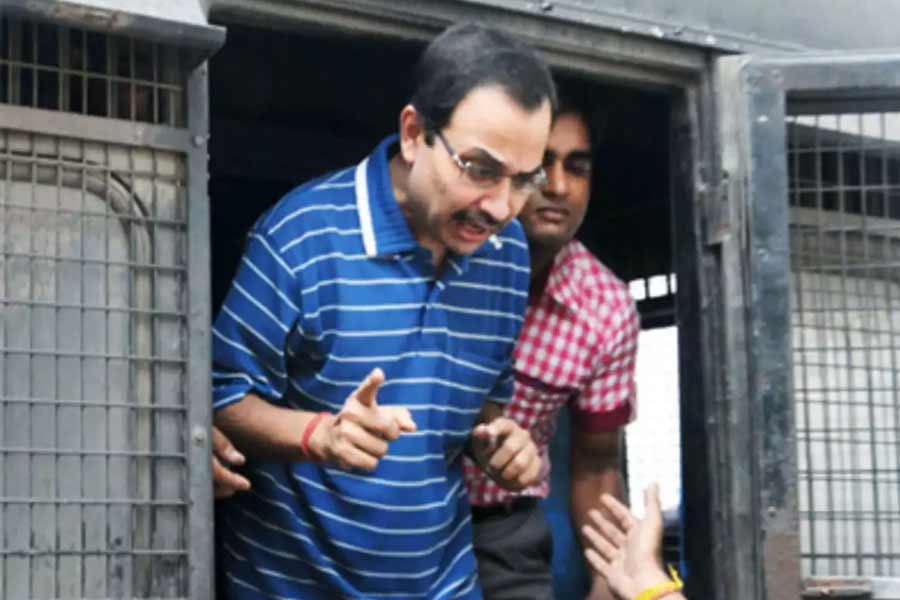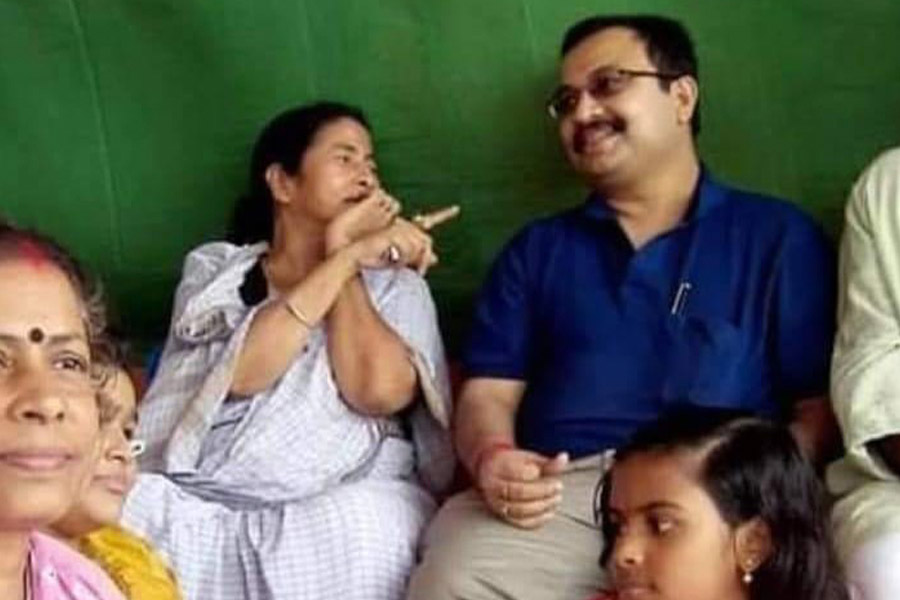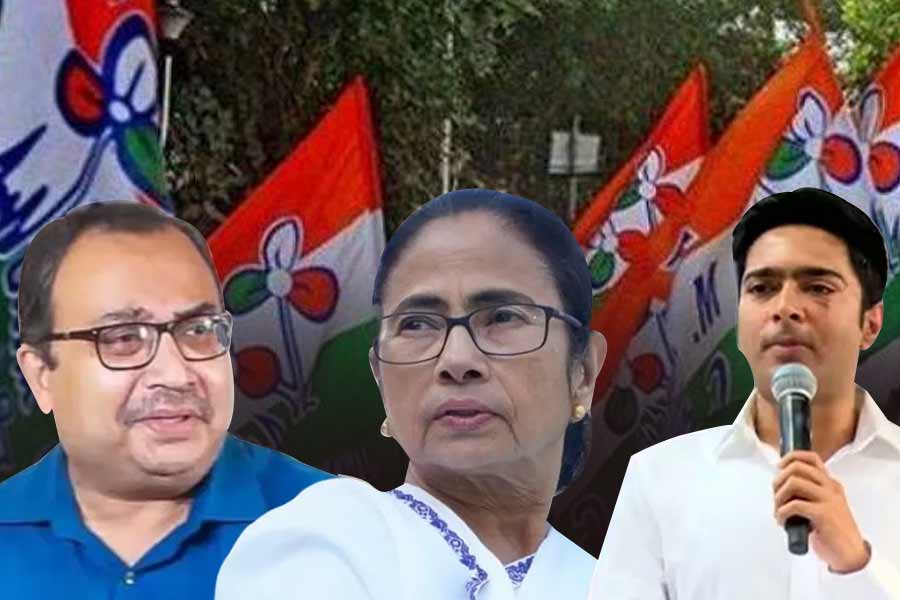Since his comeback to the Trinamul Congress fold as a state-level spokesperson in July 2022, Kunal Ghosh has emerged as the go-to-man in both the ruling party and sometimes the Bengal administration. It’s difficult to believe that this is the same man who spent around three years in jail for his alleged role in a financial scam when the party was at pains to distance itself from him.
No wonder then that the buzz around a recent top-level bureaucratic appointment leads to him. Or so says the grapevine. Looking to end her bureaucratic exile at the state gazetteers department where she was transferred to in February 2013, IAS officer Nandini Chakravorty had turned to the 55-year old journalist-politician. A little nudge from Ghosh is believed to have helped her on the way to becoming the state home secretary on the last day of 2023, after a brief stopover at Raj Bhawan.
Ghosh was once a trusted aide of chief minister Mamata Banerjee and a Trinamul Rajya Sabha MP. He was also imprisoned for his alleged role in the Saradha scam, a ponzy scheme that went bust and is apparently worth over Rs 2,500 crore, claim investigators.

Kunal Ghosh tries to talk to the media from a prison van circa 2013. PTI
Today, Ghosh is one of the 22-state level spokespersons of the ruling Trinamul and also a state secretary. He is believed to be the closest to Mamata Banerjee’s heir-apparent and the party’s all-India general secretary Abhishek Banerjee, giving him a clout that few enjoy in the organization.
Curiously enough Chakravorty and Ghosh’s falling out with Didi happened in the same year, 2013, but a few months apart. These days, Ghosh is the most visible Trinamul face on television screens. The angry, sometimes acerbic comments that sprout from his mouth, are faithfully reproduced in local Bengali dailies the next morning.
To onlookers, Ghosh appears as Abhishek’s principal sniper, ready to take on anybody from the Opposition, especially the BJP’s Suvendu Adhikari, who was once Mamata’s trusted lieutenant. Those close to Ghosh say Adhikari is in the list of five people, whom he considers his adversaries. Another notable name being that of the state’s acting director-general of police, Rajeev Kumar. Abhishek, too, never shared a favourable equation with either of the two.

Those days. A photograph from Kunal Ghosh's Facebook page.
Ghosh— he still loves to play football in his free time – does not hesitate to take potshots, often something more than a mere potshot, at the elderly lot within the Trinamul, whom he sees as an obstacle to Abhishek’s taking over the reins of the party from Mamata at some point in the future, near or distant. Many in the Trinamul believe Abhishek would like it to be near and Ghosh not just concurs, but acts accordingly. He also has organisational responsibilities in the two Midnapores and South 24-Parganas, from where Abhishek is an elected MP.
On Abhishek’s behalf Ghosh has picked up cudgels against most of the Trinamul old guard, career-politicians like Subrata Bakshi, Saugata Roy, Kalyan Banerjee, Sudip Bandyopadhyay, Firhad Hakim, or turncoats like Barrackpore MP Arjun Singh.
There are two questions that no one seems to have clear answers to. How has Ghosh, perhaps the only one in Trinamul who publicly vilified his party supremo Mamata Banerjee when he was in jail after being arrested for alleged corruption, reached where he is now? And why is he doing what he does?
A senior Trinamul leader scoffed at the idea of Ghosh getting to spread his wings again. “Magnified,” he replied in one word when asked about Ghosh’s current role and contribution to the party. “He has his utilities. He is used to build a counter narrative, shoot at opponents. Bhaloi kaaj korchhe (He is doing good),” the leader said.
Apart from organisational duties, Ghosh also handles the editorial responsibilities of Trinamul mouthpiece Jago Bangla, while editing a Bengali daily he has been associated with all through his career (except for the days behind bars) and a portal that he had launched before his political rehabilitation in July 2020.
In the months between November 2013 and October 2016, when Ghosh was being moved from prison to prison in Bengal— he was arrested by the state police and later CBI for his alleged involvement in the scam -- he would shout to awaiting television cameramen while jostling with cops. At every opportunity, he would drop the name of chief minister Mamata Banerjee, accusing her of being “the principal beneficiary of the scam”.
Ghosh has, to this day, insisted on his innocence by saying he was made a scapegoat. Visuals of his banging prison vans from inside and shouting from court steps to anybody who would care to listen may have faded from public memory in these 10 years. But Ghosh is still blaring loudly into TV cameras, though the targets are now different.
That nothing has come out of the Saradha case, being probed by the CBI and the Enforcement Directorate, yet is another story. That Ghosh came out unscathed even after levelling such accusations against a Bengal leader whose personal probity has remained unquestioned is what many in the Trinamul still wonder about.
Those familiar with Mamata Banerjee’s style of politics and the early days of the Trinamul Congress, especially the first six years, are aware of the fate that awaited leaders who sparred with her. Three names come to mind: the late Ajit Panja, the late Pankaj Banerjee and Sudip Bandyopadhyay, now MP from Calcutta North.
Panja, once a Union minister, died a councillor in the Calcutta Municipal Corporation, while Banerjee, the first leader of the Opposition of the Trinamul, was pushed into political oblivion and met with a lonely death. Both had differences with Mamata.
Twenty-one years ago, Sudip Bandyopadhyay almost became a minister in the AB Vajpayee-run government by holding on to the hands of Lal Krishna Advani much to the chagrin of his party boss. Mamata promptly expelled him. Bandyopadhyay did manage to somehow salvage his career, returning to the Trinamul fold later, the banner of revolt tucked away somewhere.
Any observer of Bengal politics knows Ghosh’s stature as a politician is nowhere near the trio of Ajit Panja, Pankaj Banerjee and Sudip Bandyopadhyay. Yet the punches he is packing in recent months makes him eligible to be counted as a heavyweight.
“It was Abhishek’s idea to give the responsibility of the party mouthpiece to Ghosh. Gradually, he was given other responsibilities,” said a Trinamul MP. Abhishek was a mere kid when Panja and Pankaj Banerjee were active. None of them had the political clout to take on Mamata, while Abhishek, being the nephew and heir-apparent, has a say, even if feeble at times. This works to Ghosh’s advantage. Insiders say whatever his posturing on television against Trinamul elders, Ghosh stays within his brief. “He doesn’t poke his nose into Delhi matters,” said another Trinamul MP.
In different eras in Bengal, Ghosh had had different levels of proximity with leaders of various hues, like the late Somen Mitra, whose career swung from Congress to Trinamul and back. The year then CPM state secretary Anil Biswas died, at North Calcutta’s Rammohan Sammilani Durga Puja pandal, of which Ghosh is one of the main organizers, an exhibition of the late CPM leader’s photographs was held.
Unlike now, when Mamata was a rising political force in Bengal in the 1980s and ’90s, she found there was little space for her in the media as she got overshadowed by those senior to her in her then party, the Congress.
Ghosh and a few other journalists from the local media got close to her at this juncture. By the time she became railway minister for the second time in 2009 and the CPM’s departure from the corridors of power was imminent, a section of the journalists around her formed a close-knit group, almost resembling a cabal, dedicated to pushing her messages across the media. And Ghosh emerged as this group’s undisputed leader. The group grew even more powerful after she became chief minister in 2011, with an undeclared race on who gets a place in the back seat of the car she used to commute in.
Around 2010, Ghosh controlled a pack of dailies from Calcutta published in Bengali, Urdu and English, another weekly in Bengali and a television channel launched by the Saradha group, which went on to acquire some more news channels, a music channel, and launch another English daily from Guwahati. The group’s media outlet, along with the daily which Ghosh has been associated with all his life and still is, self-branded as pro-Mamata, serving as her propaganda vehicle.
While other members of this group may have remained gratified with the proximity to the new chief minister and access to instant news, Ghosh possibly was far more ambitious. In 2012, he took the next leap upon being nominated to the Rajya Sabha as an MP, along with owners of two more Hindi and Urdu dailies. Ghosh was the only employee journalist among the trio.
If Ghosh’s rise was meteoric, his fall a year later was no less.
The Saradha scam broke in April 2013 and the Trinamul was looking for a scapegoat. The same month, the Saradha Group chief, Sudipta Sen, was arrested from Jammu and Kashmir. In September that year, Ghosh, still a Rajya Sabha MP, was suspended for making anti-party statements and arrested two months later.
After 34 months, when he stepped out of prison, Ghosh found he no longer had a place at any high table. Soon after his release from prison, the BJP did try to swing him around by offering him a seat at the Telephone Advisory Committee (TAC). Ghosh turned it down politely.
To draw parallels between French national politics from around a decade ago and present day Bengal is to over-stretch matters. It is said the art of comeback in French politics lies in writing a book. Around the time Ghosh was behind bars, former French prime minister and foreign minister Alain Juppé, wrote two books. Juppe would know a thing or two about political scandals, having spent his exile in snow-clad Quebec, following his conviction in a fake job scandal.
Ghosh, by his own count, has penned around 41 books, some of them based on his prison experiences. The latest one was unveiled last month in the presence of a number of state ministers and luminaries. In January 2020, two of these books were launched by former minister Partha Chatterjee, now behind bars. Many believe Ghosh had reached Abhishek via Chatterjee, though that did not stop him from attacking the former Number Two in the government after his arrest in July 2022 in a teacher recruitment scam. “He (Partha) should realise how it feels in jail. As I have spent my life in prison let Partha do the same,” he had commented, drawing censure from the party.
On the tenth anniversary of his arrest last November, Ghosh made an emotional post in Bangla on Facebook, though it reveals little about his endgame. “The tears I and those close to me have shed will not go in vain. Time will prove it. God will not spare the conspirators. I am with the Trinamul Congress to prove that I serve the party from the deepest core of my heart. I am a soldier. Kunal Ghosh is not dishonest. I won’t become a party MP or MLA. I won’t become an elected representative. As long as I want to I will serve the organisation. Wherever life leads me, I will go. I have not forgotten the days spent behind bars and the attempts to malign me. I will not forget,” he wrote.
Those familiar with the rules of chess are aware of pawn promotion: when a pawn reaches the farthest rank from its original square, the player is allowed to replace it for a queen, a rook, a bishop or a knight. Many prefer to promote a pawn to queen.
Once upon a time Ghosh became a “scapegoat”. For the last four years or so he has willed himself into a pawn in Bengal’s daily politics. Time will tell whether this Trinamul pawn is for sacrifice or promotion.











